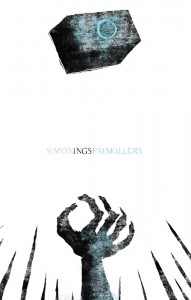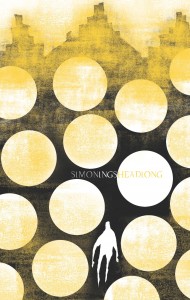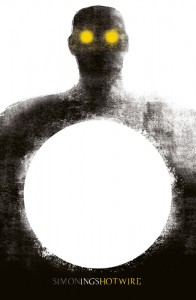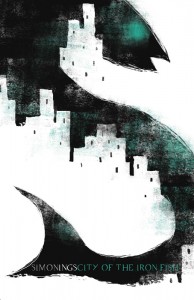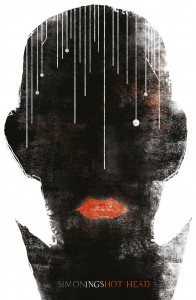“[a] superbly busy novel of discovery and betrayal, piracy and espionage”
Category Archives: books
Dead Water’s first review is through
from Johann Carlisle at Future Fire
Dead Water’s on Amazon
Anyone curious to know where the hell I’ve been for the past four years (or, indeed, why I ever bothered to come back) can jolly well pre-order the hardback which comes out on 1 August, and there’ll be a Kindle edition a month before that (they’re just sorting out the pricing).
The main reason for posting this was I thought this was the final (final) ((final)) cover image. It actually turns out be the version before the version that was the final (final). Anyone wondering what publishers do with all their money now have their answer: it’s spent on rehab after having to deal with revisions to the (((final))) revised (final) revised new final.
Dead Water
Here’s our first (proper) cover design for Dead Water, a novel that shoves contemporary pirates in one end of the accelerator, late-nineteenth century cosmology into the other, and throws a very large switch.
Nic thinks this cover can be finessed – we don’t need the wavy lines on the type, for example. Otherwise, we like it. What do you think?
The Weight of Numbers (2006)
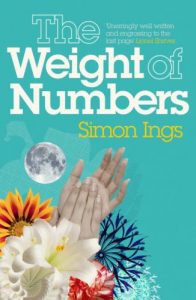
On July 21, 1969 two astronauts set foot on the moon; far below, in ravaged Mozambique, a young revolutionary is murdered by a package bomb.
Strung like webs between these two unconnected events are three lives: Anthony Burden, a mathematical genius destroyed by the beauty of numbers; Saul Cogan, transformed from prankster idealist to trafficker in the poor and dispossessed; and Stacey Chavez, ex-teenage celebrity and mediocre performance artist, hungry for fame and starved of love. All are haunted by Nick Jinks, a man who sows disaster wherever he goes. As a grid of connections emerges between a dusty philosophical society in London and an African revolution, between international container shipping and celebrity-hosted exposés on the problems of the Third World, The Weight of Numbers sends the spectres of the baby boom’s liberal revolutions floating into the unreal estate of globalization and media overload
What the reviewers said
Having cut his teeth on a series of intelligent thrillers, Ings makes a bid for the literary big time with this stunning, gutsy novel that takes a single incident—the suffocation of 58 immigrants in a lorry bound for Scotland—and traces back its causes through the life stories of those involved. Dozens of deftly drawn characters, an acute understanding of geopolitics, an epic historical sweep and a serious talent for storytelling make this one of the most exciting—and relevant—books of the last year. Booker material, for sure.
Arena
In the corner of the literary landscape in which a few of us sit, hunting for ways to work ever exciting and dynamic thinking from the sciences into the contemporary novel, The Weight of Numbers is extremely good news. It’s a dynamic, innovative, and compelling book that brings into focus some of the most interesting trends in contemporary fiction, and Simon Ings deserves more than a sniff of at least one prize for his efforts.
James Flint, The Daily Telegraph
It is unlikely there will be a finer written fiction this year. . . . Ings stalks his targets with the relentlessness of a bounty hunter, until he arrives at a new heart of darkness with the important discoveries that in the vacuum of contemporary life there is nothing to distinguish the apparently morally dubious world of human trafficking from the ‘migrainous white noise of the subsidised arts,’ and that self-expression is no more guarantee of satisfaction than silence.
Chris Pettit, The Guardian
[An] ambitious, exciting novel . . . Ings’s prose can ascend into theoretical, visionary territory, but is rooted in the mess of human experience. A sudden sexual encounter in a bombed-out London library, an anorexic slicing a muffin in a Florida restaurant, a horror show of violence in Mozambique — these are unforgettable scenes, evoked with a lean, immediate physicality.
Tom Gatti, The Times
Its stupendous breadth leaves you giddy.
Nottingham Evening Post
The scale of Ings’s ambition is proportionally matched by the precision of his prose. Every sentence, image and line of dialogue is balanced and true. It isn’t its clever design or technical achievement that makes it compelling so much as its beating human heart.
The Independent on Sunday (UK) (5/5 Stars)
This novel could have collapsed under the scale of its own ambition. But instead it triumphs.
Sunday Business Post
Ings weaves an ingenious, shimmering web of contiguity and chance. . . . A feat of meticulous plotting . . . Ings’s project is not dissimilar from David Mitchell’s Cloud Atlas, with which it has been compared.
Alistair Sooke, The New Statesman
Characters emerge from different places, periods and experiences, and yet their fraying threads are teasingly revealed to be of the same fabric….Ings has wrought an unorthodox anti-history of the past six decades. The Weight of Numbers is a dizzying feat, redolent of Don DeLillo and David Mitchell in its density. Only when its framework is revealed are its mysteries unraveled.
Gavin Bertram, New Zealand Listener
Simon Ings’ ambitiously genre-defying The Weight of Numbers is a virtuoso display of imaginative plotting.
Financial Times, ‘Novels of 2006’
A Scheherazade of a novel, executed with scope, daring, and humour. The Weight of Numbers is unerringly well written, and engrossing to the last page.
Lionel Shriver, author of We Need to Talk About Kevin
Like Don DeLillo’s Underworld, Simon Ings’s remarkable new work delivers nothing less than a secret key, a counterhistory, of the last sixty years. Ings’s fiction is vivid and swift, a thing of scenes and people, smugglers and astronauts, spies and revolutionaries. But beyond the topical excitements lies something even grander—a vision of our culture as a death ship. The Weight of Numbers is amazing.
Mark Costello, author of Big If
Painkillers (2001)
I remember them. Their mouths, and their needles. That is all. That, and their painted eyes. Their mouths. They never spoke… So begins Adam’s odyssey into a nightmare of corruption and violence, where it is only his forlorn hope that he is helping his autistic son Justin that offers any solace. As everything implodes around him, Adam risks everything – his marriage, his family, his life – to lay hands on the one thing that might save him. His way out. His grail. A small bakelite box with a dial.
A grim, gripping and unrelenting tale in which a neat and happy ending is simply not an option.
IRISH INDEPENDENT
Cinematically graphic yet deeply literate, Painkillers offers a chilling ride into a hell both individual and universal.
ASIMOV’S
Headlong (1999)
What do you do when your head’s full of useless sockets, when you’ve been superseded by AIs, when you’ve been dumped back into a world where you can’t function properly and even schoolchildren take the piss? Headlong follows its post-human protagonist along the rough and uneasy road to normality.
Headlong, Simon Ings’ fourth novel, is an intelligent, compassionate portrayal of one man’s struggle to rediscover his humanity after the plugs wiring him up to enhanced sensory input are disconnected. The focus is on Christopher and his grapplings with everyday life, told in well-chosen, prosaic detail… Unlike many who write about neural implants and cyberspace, Ings remains firmly grounded in the everyday, with its small triumphs and disasters and roots in human frailty. Yale’s relationship with his posthuman powers is not simply one of longing for paradise lost. Rather, the message of this mature and thoughtful book seems to be that, ultimately, the human condition is worth fighting for, and transcendent itself in comparison to the mire and immorality of a dystopia that may be just around the corner.
New Scientist, 27 February 1999
Simon Ings’s irrepressible imagination has fallen headlong into a world that is truly strange — and strangely true.
George Dyson (author of Darwin Among the Machines)
A weird, wired and wonderful book from one of the brightest stars of future fantasy.
Attitude
After the frenetic ultra-stylism of cyberpunk, science fiction has slowed down a little. This wistful novel is a terrific example of the new genre: its main character Christopher Yale has been augmented, uploaded and implanted, but all he wants is to be human again. When his wife Joanne is killed, he must overcome his alienation from the ‘real world’ to avoid suffering the same fate. Various conspiracies unfold around a strange new drug, but the real story is Yale’s painful devolution to a regular human being. Simon Ings, my telepathic abilities tell me, has a serious career ahead of him.
Carrie O’Grady in The Guardian, Saturday 20 January 1999
For over 300 pages we share the life of a post-human who has to learn, again, to be human. It’s a compassionate and engaging piece of work. And it is a seriously good book.
Keith Brooke, Infinity Plus
Hotwire (1995)
Not a sequel to his first novel Hot Head, but set in the same world and sharing some of the same preoccupations, Simon Ings’ Hotwire asks some interesting questions about how we become human, and how to become human again. Ajay made some bad choices once upon a time–he got his grandfather killed and his sister horribly mutilated; to pay to have her rebuilt, an organ at a time, he has become an all-purpose heavy, first a secret policeman and then an assassin. Rosa has never had any choices–she roams, inconsequentially, the corridors of the space station that is, in a very real sense, her mother, scared of everything she meets and sees. When these two find themselves in improbable alliance, the consequences could be scary, and are highly charged and erotic and at times touching. This is a book about coming to terms with reality, and the very improbability of much of the reality with which the central characters have to come to terms does not lessen the hardness of their choices and our sympathy with them. Full of strongly visualised exotic settings–the slums of Brazil and the interiors of mind human and artificial–this lives up to Ings’ early promise.
Roz Kaveney
How crude and primitive we first-generation cyberpunks and our works look now! Such anyhow were my thoughts upon finishing Simon Ings’s new novel Hotwire. Perhaps only a cusp writer like Ings (born 1965) could have produced this laser-gazed logicbomb of a book, simultaneously appalling and heartening, monitory and embracing. There is nothing extraneous in Ings’s writing, and much that is marvellous. Blink between sentences, and you might miss something. From the Carrollian environment of Rosa’s birthplace to the favelas of Rio, Ings offers cinematic thrills galore.
Paul Di Filippo in Asimov’s October/November 1996
Moving from a Trinidad wasted by the new drug ZB15 to an underworld Havana of organ bootlegging, Brit SF writer Simon Ings sketches out a corporate future that is both intriguing and unsettling. You should read Simon Ings.
iD, September 1995
Bursting with ideas bigger than many writers can cope with even as reading matter, Ings is second-guessing not only sf readers, but the planet.
Nick Royle, Dazed and Confused 13
Simon Ings has taken virtual reality way beyond the cyberpunk fathered by William Gibson. Ings is a young British writer with an assured future.
David Barrett in New Scientist, 14 October 1995
This is a book about the assertion of human values against those of the power broker and the machine. As such, it can lay claim to the credentials of a romance, and one played out against a more than usually bleak and hostile background. Ings lays it on the line.
Interzone 101, Autumn 1995
City of the Iron Fish (1994)
My second novel, written in a brothel in Oporto, on the run from my reputation as a cyberpunk writer.
“In its curious juxtaposition of the ceremonial and the mundane, railways and wheeled sailing vessels, cafes and whore-houses, City of the Iron Fish is disconcerting, funny and occasionally horrifying, a dark fantastic comedy of the baroque and burlesque.”
Vector, August/September 1994
“Ings’s explorations of how the various arts of painting, drawing, poetry, sculpture, opera, drama and even sex theatre try to invest meaning in a world that sustains none of its own are provocative and intelligent. City of the Iron Fish is a rare treat.”
Locus, December 1994
This is a place where all forms of artistic expression feed on each other and the past, constantly repeating and vainly striving. I found this to be a deeply strange book, and I was impressed that the author did not try to explain. Somehow it all worked better to read of Kemp’s life as he lived it, without knowing these things, and stumbling along in this strange world without a map. His passions, confusion, pain and everyday life are laid out to see, and even an evening’s drunken debauch has a ring of truth to it that is very appealing.
Novel Reflections
Hot Head (1992)
And the heroine does come through, and the world does get saved…
At only 25, Simon Ings goes into orbit as a science fiction master.
Daily Mail, 21 May 1992
Even the urban decay and high-tech futurity of Blade Runner doesn’t have the sense of all-pervasiveness that Ings’s book has. His first novel, Hot Head, confirms him as a bright light on an otherwise dim horizon.
The New York Review of Science Fiction, No 56, April 1993
Entertaining and intelligent
Time Out, July 1 1992
There is something perverse about a story of hi-tech high adventure which not only insists on describing the damaged childhood of the heroine in quietly sinister detail, but holds the attention while it does so. Simon Ings’ first novel has a charismatically neurotic protagonist — a lapsed Islamic cyborg with a defective exoskeleton nostalgic for the extra senses that the authorities have taken away. She was part of a military force that saved the world once, from the angry Artificial Intelligence Moonwolf, but she is reduced to making blue movies to get access to exotic sensory equipment. And no matter how badly the authorities have behaved, they will always need you when the Earth is in danger again… This is less a cyberpunk novel than one which shares some of the same noirish preoccupations as cyberpunk — AI, the extension of human senses, strange virtual realities — in this case a decrepit seaside resort that is also a lesbian paradise of wistfulness and good coffeeshops. And the heroine does come through, and the world does get saved, but this was never going to be a book that ended otherwise. Hot Head is a remarkable debut, full of startling imagery and set pieces of bizarrely inventive action.
Roz Kaveney




